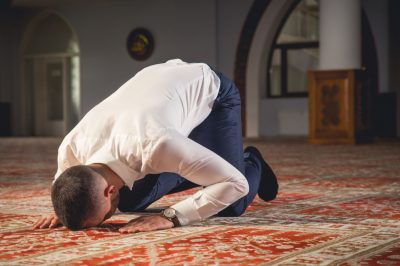The State of Heart and Mind Required During Prayer
Prayer is not merely the words pronounced by the tongue and the movements carried out by the body. It must be performed with Khushu‘ (the heart being gently humble and the mind being focused and attuned to the act of worship).
Prayer has a body and a soul. Its body is made up of the series of motions and postures that include standing, bowing, prostrating, and reciting, while its soul is made up of the presence of the heart in prayer and Khushu‘. Allah, the Majestic, praises those who keep their hearts humbly focused on Him during prayer, saying:
Successful indeed are the believers. Those who offer their prayers with Khushu‘. (Quran 23:1-2)
Khushu‘ can be defined as the careful attentiveness of the mind to what is being said and done during prayer, with due consciousness of the Exalted Status of the Lord before Whom you stand and speak. This puts the heart into a state of gentleness, modesty, awe, submission, and humility before Allah’s Greatness. This inner state is manifested in the body, producing stillness of senses and calmness in movements, with total mental and emotional focus on the prayer without the mind wandering away or getting distracted.
Khushu’ is the essence of prayer. Some scholars have said:
“Salah without Khushu’ is like a dead corpse.”
Khushu’ is of Two Kinds
1. Khushu‘ of the heart, which consists of bringing the full intention and attention of the heart to prayer, with constant contemplation of what is being recited.
2. Khushu‘ of the body, which consists of peaceful stillness of the body and avoidance of unnecessary actions (such as yawning, fidgeting, adjusting clothes, or looking at a watch) or allowing the eye or mind to be drawn to anything outside the prayer.
Necessary Composure While Performing the Various Acts of Salah
One day, Prophet Muhammad (peace and blessings be upon him) entered the mosque and saw a man hastily bowing and prostrating while praying, so he said to him:
Go back and pray, for you have not prayed.
The man said:
“By the One Who has sent you with the Truth, I cannot do any better than this. Please, teach me.”
The Prophet (peace and blessings be upon him) said:
When you stand up for Salah, say Takbir (“Allahu Akbar”), and then recite whatever you can of the Qur’an (what you know by heart). Then bow until you become peacefully still in your bowing, then rise until you are standing up straight. Then prostrate until you are peacefully still in your prostration, then sit up until you are peacefully still in your sitting; and do that throughout your entire Salah. (Narrated by Al-Bukhari)
Maintaining composure and stillness throughout prayer is an integral part of it, without which it becomes invalid. For this reason, Prophet Muhammad (peace and blessings be upon him) invalidated this man’s prayer.
The amount of composure and stillness required during each integral act of prayer (standing, bowing, prostrating, or sitting) is that which extends for a length sufficient to say the prescribed recitation or essential utterance of prayer in that act. Some scholars have said:
“It is staying still in every integral part of prayer for a length of time sufficient to allow every bone to return to its proper place.”
What negates composure while praying is hasty movements, so the person praying does not straighten their spine in the bowing, prostrating, or sitting position. Such a hurried manner of praying renders the Salah null and void.
Perform your prayer slowly and tranquilly, giving each part its due attention. Do not move quickly to the next step; instead, keep your body steady and calm, allowing each joint and bone to return to its normal place before proceeding to the next action.
Helpful Ways to Acquire Humility and Focus during Salah
Remind Yourself in Your Salah
1. Remind yourself that you are worshiping the Great and High and Exalted and Majestic Lord Who sees you, hears you, knows you, understands you, and watches over you.
2. Remind yourself of your Lord’s Glory, Grandeur, Power, Majesty, and Splendor.
3. Remind yourself of your standing before Him (Exalted be He).
4. Remind yourself of Allah putting His Face to yours during Salah; it is authentically reported that Prophet Muhammad (peace and blessings be upon him) said:
Allah commands you to offer Salah. When you are offering Salah, do not turn away; for Allah directs His Face towards the face of His praying servant, as long as they do not turn away. (Narrated by Al-Tirmidhi)
The great scholar Ibn Al-Qayyim clarified that the act of turning away that is prohibited during Salah falls into two categories: The first is the heart turning away from Allah, the Exalted and Glorious, to something else. The second is the eyes turning away from Allah to something else.
Try Feeling This Way during Salah
1. Try to feel every movement and statement you make during Salah and resolutely focus on performing every part of it slowly and deliberately. Avoid performing it mechanically and unconsciously as a passionless routine, without attention and awareness, or just praying with the tongue without engaging the heart.
2. Be keen to perfect your prayer so you do not miss out on its reward. Remember that a person praying will only be rewarded for the portion they performed with proper presence of mind and humility. Prophet Muhammad (peace and blessings be upon him) said:
A person may offer Salah and nothing of it is recorded for them except one tenth of it, one ninth of it, one eighth of it, one seventh of it, one sixth of it, one fifth of it, one quarter of it, one third of it, or half of it. (Narrated by Imam Ahmad)
3. Prepare yourself before entering into Salah and meet any basic human needs that may distract you from focusing on it, as the hadith says:
You should not pray when food is served or when resisting the urge to urinate or defecate. (Narrated by Muslim)
4. Choose a quiet place to pray, free from noise, motion, and distractions (like people walking or chatting around you, or telephones ringing, or the TV playing in the background), so you can focus on your Salah.
(From Discovering Islam archive)


